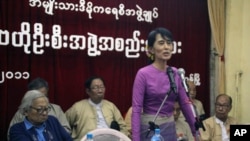Burma’s opposition National League for Democracy has announced it will re-enter politics in upcoming elections following reform moves by the military-backed government.
Nobel Prize Laureate Aung San Suu Kyi, who leads the party, is expected to run for office after more than two decades of being side-lined by authorities.
The unanimous decision was made by the party’s central executive committee in response to changes in election and party registration laws and government reform efforts.
The return to politics poses no direct challenge to the military-backed government as there are fewer than 50 of more than 500 parliamentary seats available.
But it would thrust Aung San Suu Kyi back to the political spotlight following nearly two decades of house arrest and side-lining tactics by the government.
Speaking in Rangoon to supporters and the media Friday, she said the time was right for them to re-enter politics.
People, she said, are watching, reviewing, and judging what the NLD can do while they have this very tiny chance. And she pointed out this is why they need to decide to work with an open mind for what people need and what the country needs.
2010 watershed year
The NLD boycotted nationwide elections in 2010, the first in twenty years, because of rules that required they participate and expel Aung San Suu Kyi or be banned from politics.
Critics called the election a sham designed to cement military rule in the guise of democracy.
A military-backed party was declared the winner and Aung San Suu Kyi was released from house arrest just days later.
In recent months even Burma’s harshest critics like the United States have been surprised at reforms the government says are aimed at restoring democracy.
Signs of change
After coming to power in March, President Thein Sein relaxed tight controls on the media, allowed labor unions, stopped an unpopular China-backed hydropower dam, held direct talks with Aung San Suu Kyi, and released more than 200 political prisoners.
Rights groups, however, point out there are still hundreds of political prisoners behind bars and that reforms can quickly be reversed.
Dave Mathieson, a Burma researcher with Human Rights Watch, says although the NLD is reentering politics, its political struggles are far from over.
“I don’t think we should be underestimating the challenges the NLD is going to face given that they have been subjected to two decades of pretty harsh treatment on the part of the government and security services," Mathieson said.
Skeptics say the government’s reforms are meager and merely aimed at getting international legitimacy.
Others, including Burma’s neighbors, are more hopeful. Leaders of the Association of Southeast Asian Nations this week elected Burma as chairman for its 2014 meetings, citing its progress on democratic reforms.
Clinton trip
On Friday, President Obama announced U.S. Secretary of State Hillary Clinton would next month visit Burma to meet with officials and Aung San Suu Kyi.
At the summit in Bali Friday, Surin Pitsuwan, the ASEAN Secretary General, said the U.S. president and ASEAN are both hoping that Burma’s political progress will continue.
“I expect some reciprocal movement," he said. "I think the U.S. reaction is certainly a reciprocal posture thanks to the developments inside [Burma]. And I am sure there will be other partners who will be looking at ways how they can encourage the process further.”
Despite the new political outreach to Burma’s government, the United States and the European Union both have economic sanctions against Burma for its rights abuses.




